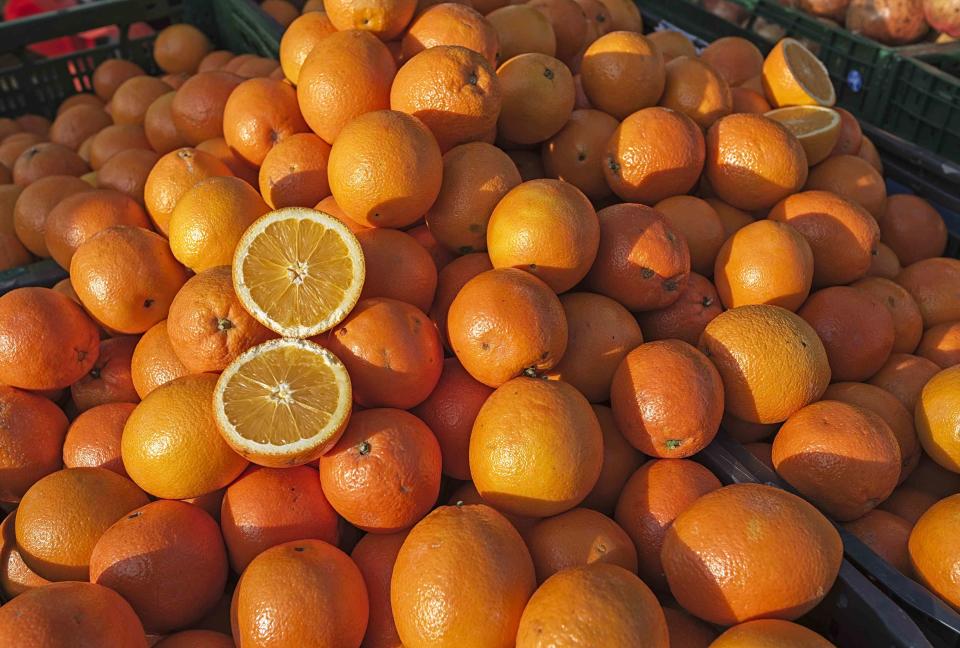Here's Why Orange Juice Is Ridiculously Expensive Right Now
Need proof climate change is affecting you? Just look at the price of your favorite OJ.

jada photo / Getty Images
Your next glass of orange juice may taste a little off. That's because it may not be made entirely with oranges.
According to the 2024–2025 study by Fundecitrus, a research association in Brazil formed by the nation's citrus growers and manufacturers, the orange forecast for the year is downright abysmal. And that's a very bad thing when you consider that Brazil is the leading producer of oranges in the world.
The report explains that diseases like citrus greening and pests have caused a significant drop in this year's potential yield. However, neither of those things compares to the impact of climate change.
"The data shows that, once again, the climate emerges as the main cause of the significant drop in production," the findings state. "Since June 2023, the citrus belt has been affected by the El Niño phenomenon, classified by the World Meteorological Organization (WMO) as one of the five most intense ever recorded." The last El Niño event, it added, had a "severe impact" on the crop, causing an 18% drop in production. But, this season, it's also contending with high temperatures, high evapotranspiration rates, and "an intense water shortage."
And things are only going to get worse.
Related: Former White House Chef Says Coffee Will Be 'Quite Scarce' in the Near Future
"In addition to the already observed climatic adversities, which resulted in a reduction in the number of fruits per tree," the team said, "the forecast of drier weather over the next six months is expected to continue impacting the crop, further hindering fruit growth and increasing the challenge of keeping groves supplied with water even where irrigation systems are installed."
As the findings shared, the average yield this season is 691 boxes per hectare or 1.38 boxes per tree, marking an almost 25% decrease compared to the 911 boxes per hectare, or 1.81 boxes per tree harvested in 2023–2024.
The team ominously added, "Should this production forecast hold true, this will be the second smallest crop since 1988–1989, when forecasts using the objective method began to be performed in the citrus belt."
Brazil also isn't alone in its low orange yield. As Quartz pointed out, the May report by the U.S. Department of Agriculture showed that citrus production in Florida is down 5% from April.
Related: How Does Climate Impact Wine?
All of this has not only sent the price of orange juice skyrocketing — with prices of orange juice increasing 26.82% since the beginning of 2024 and prices for orange juice concentrate jumping to $4.95 per pound, more than doubling the price from a year ago — it's also leading companies to rethink orange juice altogether.
Beverage Daily reported, the UK company Coldpress is launching a mandarin juice to give consumers an alternative that offers many of the same benefits as oranges, as is the U.S. company Uncle Matts, which told the publication it's launching new teas and wellness shots to balance out its brand.
And they aren't alone. Food Ingredients First reported, several other orange juice bottlers around the world are considering similar measures.
Related: Why Olive Oil Is About to Get More Expensive
“We need to be open to it. Citrus breeders have been successful in breeding orange-like hybrids that look, smell, and taste like sweet oranges with significant tolerance to huanglongbing,” Rick Dantzler, chief operating officer at the Citrus Research and Development Foundation, told the publication.
Still, the switch to mandarins and other fruits could take time, as it involves potentially changing regulations and diverting fruit from one pathway — usually right to grocery stores — to another.
“Many fruits are destined for the fresh market, and it is not easy to divert this flow to the juice industry," Francois Sonneville, senior analyst for beverages at Rabobank, shared with Food Ingredients First. Sonneville added that processing mandarins to be used in orange juice blends will produce "logistical problems," including the fact that many orange processing plants are located in "places convenient for oranges," not mandarins. So, for now, you may just be stuck paying extra for that bottle of OJ.
For more Food & Wine news, make sure to sign up for our newsletter!
Read the original article on Food & Wine.

 Yahoo Finance
Yahoo Finance 